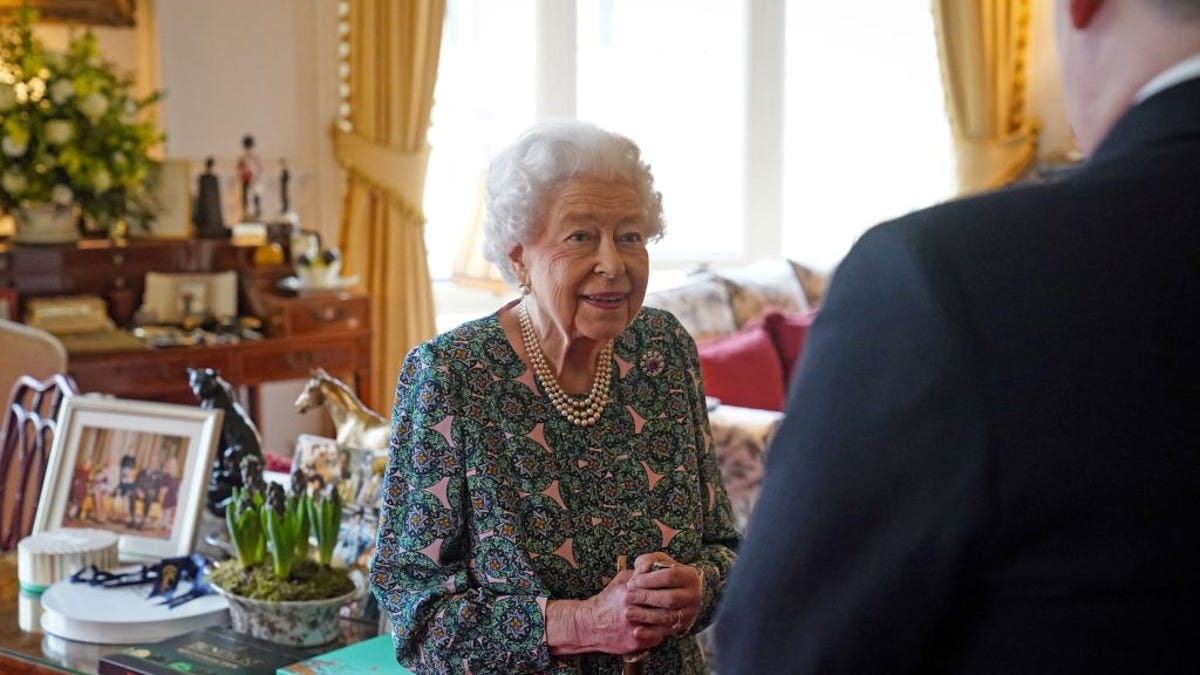Queen Elizabeth II Tests Positive for COVID: Everything We Know
The 95-year-old British monarch has been vaccinated and reportedly is experiencing only mild symptoms.

Queen Elizabeth II speaks with incoming Defence Service Secretaries Major General Eldon Millar at Windsor Castle on Feb. 16. The queen has tested positive for COVID.
COVID-19 doesn't care who you are. Celebrities, CEOs and ordinary folks have all come down with the coronavirus, and it hasn't spared royalty, either. Queen Elizabeth II tested positive for COVID-19 in late February, Buckingham Palace said in a statement cited by the BBC. The queen is vaccinated and her symptoms have been mild, according to the statement, but the situation has forced some adjustments to her schedule. Here's what to know.
The royal basics
Queen Elizabeth II is 95, and will turn 96 in April. While the monarch's health decisions are kept fairly private, she did make it public back in January 2021 that she'd received the COVID vaccine. She didn't make further vaccinations public, but the BBC reported that she "is believed to have had all her follow-up jabs." She's lived an extraordinary healthy life, with few known medical issues, and her mother, Elizabeth the Queen Mother, lived to be 101.
How serious is the queen's COVID?
Coronavirus is bound to be tougher on the elderly, but the palace described the monarch as experiencing "mild cold-like symptoms" and said she expects to continue "light duties" at Windsor Castle during the week, noting "she will continue to receive medical attention and will follow all the appropriate guidelines." That's for sure. If anyone can get the best medical care, it's the queen.
While the queen canceled some virtual appointments shortly after her diagnosis, on March 1, she was shown in photos meeting virtually with two ambassadors. These were the first photos released of the monarch since her diagnosis.
Also, The Daily Mail reported on Feb. 28 that the queen reunited with some of her grandchildren and great-grandchildren over the weekend.
What about those death rumors?
At least one Twitter account reported the queen's death shortly after her diagnosis, but that was untrue. Dayo Okewale, a chief of staff in Britain's House of Lords, told BNONews.com that the report about the queen's death from celebrity news outlet Hollywood Unlocked was "false," and also tweeted, "Hollywood Unlocked posting the queen is dead???? There is no credible source that verifies this. #False."
Hollywood unlocked posting the Queen is dead???? There is no credible source that verifies this. #False
— Dayo Okewale (@DayoOkewale) February 22, 2022
Many on social media mocked the unconfirmed death report.
"As you can see, I am not dead," read the caption on an image merging the queen with superhero Black Panther.
— 𝚁𝚘𝚢𝚊𝚕𝚝𝚢😈 (@royalty_999) February 22, 2022
Bro checking his sources before posting that Lizzy story 😭😭😂 pic.twitter.com/TxznE0EVir
— The Great Abti-Libaan 🧙🏿♂️ (@Abtilibaan) February 22, 2022
I’m crying what member of the royal guard found the queen dead and ran to text Hollywood unlocked😭
— cam (@pIanetseulgi) February 22, 2022
the hollywood unlocked ig account saying the queen died without a confirmed source pic.twitter.com/CeVvdR4EQR
— sk (@kirkxxs) February 22, 2022
Hollywood Unlocked said “eh we’re probably right” and hit post
— philip lewis (@Phil_Lewis_) February 22, 2022
The site eventually admitted its mistake, with founder Jason Lee writing, "I can say my sources got this wrong, and I sincerely apologize to the queen and the Royal Family."
What happens if the queen does die?
Few deaths are more rigidly anticipated than that of a monarch. The detailed plan for the queen's eventual death is called Operation London Bridge and is part of a plan created in the 1960s. One of the earliest official happenings will come when a footman pins a dark-edged notice to the gates of Buckingham Palace, and the same notice will go up on the palace's website. Parliament will meet, and Prime Minister Boris Johnson will address the House of Commons. Flags at government buildings will fly at half-staff, condolence books will be set out for mourners to sign and gun salutes will take place.
Five days after her death, the queen will lie in state for three days, with a state funeral at Westminster Abbey to follow. She will be buried in St. George's Chapel in Windsor Castle. Her husband, Prince Philip, Duke of Edinburgh, died in April 2021 at age 99, and his body will be moved from the Royal Vault in St. George's to lie beside his wife, in the King George VI Memorial Chapel. Her funeral day will be declared a day of national mourning in the UK, with two minutes of silence observed at midday.
King Charles will reign
From the moment the queen passes away, her eldest son, Charles, will be king, even before a formal ceremony for his coronation takes place. The same thing happened when the queen's father, King George VI, died in 1952. Elizabeth and Philip were on a royal tour in Kenya, and she flew back to England as its new queen.
There's been some controversy about Charles' wife, Camilla, Duchess of Cornwall. Due to Charles admitting that he had an affair with Camilla during his marriage to the much-beloved Diana, Princess of Wales, many Brits were unwilling to consider Camilla as the new Princess of Wales, much less imagine her as queen. But in a recent statement marking her platinum jubilee, Queen Elizabeth II made it clear she wants Camilla to be known as queen consort when Charles takes the throne. A royal consort is simply the spouse of a ruling monarch.

